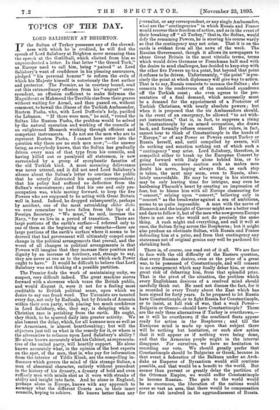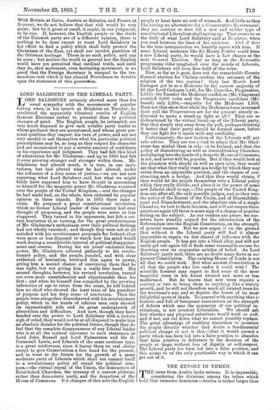TOPICS OF THE DAY.
LORD SALISBURY AT BRIGHTON.
IF the Sultan of Turkey possesses any of the shrewd- ness with which he is credited, he will find the speech of Lord Salisbury at Brighton more menacing than the speech at the Guildhall, which elicited from him so unprecedented a letter. In that letter "the Grand Turk," as Europe used to call him, being " pained " at Lord Salisbury's want of confidence in his pleasing assurances, pledged "his personal honour" to reform the evils of which his Majesty himself is notoriously the first author and protector. The Premier, as in courtesy bound, read out this extraordinary effusion from his " august " corre- spondent, an effusion sufficient to make Solyman the Magnificent or Mahmoud the Terrible rise from their graves without waiting for Azrael, and then passed on, without comment, to bewail the illness of the Turkish Ambassador, Rustem Pasha, who, with Lord Dufferin's help, pacified the Lebanon. "If there were men," he said, "round the Sultan like Eastern Pasha, the problem would be solved by the natural operation and working of the councils of an enlightened Monarch working through efficient and competent instruments. I do not see the men who are to represent Eastern Pasha. I cannot here enter into the question why there are no such men now ; "—the answer being, as everybody knows, that the Sultan has gradually driven every man of that type from his councils, and having killed out or paralysed all statesmen, is now surrounded by a group of sycophantic fanatics of the old Turkish kind. A more menacing deliverance was never uttered, and it did not need Lord Salisbury's silence about the Sultan's letter to convince the public that he utterly distrusted his august correspondent; that his policy had suffered no deflection from the Sultan's remonstrance ; and that his one and only pre- occupation was, while moving forward, to keep the five Powers who are supposed to be acting with Great Britain well in band. Indeed, he dropped subsequently, perhaps by accident, one of the most astonishing obiter dicta we ever remember to have fallen from the lips of a. Foreign Secretary. "We must," he said, increase the Navy, "for we live in a period of transition. There are large portions of the earth's surface—I referred only to one of them at the beginning of my remarks—there are large portions of the earth's surface where it seems to be decreed that bad government will ultimately compel some change in the political arrangements that prevail, and the worst of all changes in political arrangements is that Powers will imagine that they increase their position and dignity by an increase of territory, and, strange to say, they are never at one as to the amount which each Power ought to have." It would be difficult to believe that Lord Salisbury was not thinking of a possible partition.
The Premier finds the work of maintaining unity, we suspect, very difficult indeed. The great machine moves forward with a slowness which vexes the British public, and would disgust it, were it not for a feeling most creditable to British political sense, upon which we desire to say one frank word. The Unionists are taunted every day, not only by Radicals, but by friends of Armenia within their own party, with placing too much confidence in Lord Salisbury, who, they say, is delaying while a Christian race is perishing from the earth. He ought, they think, to be spurred daily into greater activity. We also lament the delay, which, for all humane men as well as for Armenians, is almost heartbreaking ; but will the objectors just tell us what is the remedy for it, or where is the alternative to reliance upon Lord Salisbury's ability ? He alone knows accurately what his Cabinet, as representa- tive of the united party, will heartily support. He alone knows accurately what, in the opinion of the best experts on the spot, of the men, that is, who pay for information from the interior of Yildiz Kiosk, are the compelling in- fluences which govern the mind of this strange Sultan, a man of abnormal character, entirely without precedent in the history of his dynasty, a dynasty of bold and even ruffianly men with minds shot as it were with streaks of ability and insight into facts. And he alone in England, perhaps alone in Europe, knows with any approach to accuracy what the different Courts are, in their inner councils, hoping to achieve. He knows better than any journalist, or any correspondent, or any single Ambassador, what are the " contingencies " in which Russia and France would recover their freedom of action, and as in the event of their breaking off" all Turkey," that is, the Sultan, would defy the remaining Powers, he is steering his course warily so that the contingency may not arise. That it is on the cards is evident from all the news of the week. The Russian Government, though it allows its newspapers to abuse Great Britain in the most vitriolic terms, terms which would drive Germans or Frenchman half mad with the desire to send challenges, has decided to keep step with the other five Powers up to a point, but beyond that point it refuses to be driven. Unfortunately, "the point" is pre- cisely the point at which diplomacy will give way to action. That is to say, Russia consents to menace the Sultan • she consents to the rendezvous of the combined squadrons off the Turkish coast ; she even agrees to the pre- sentation of a final demand, which necessarily must be a demand for the appointment of a Protector of Turkish Christians, with nearly absolute powers ; but when it is proposed that the six Ambassadors should, in the event of an emergency, be allowed "to act with- out instructions," that is, in fact, to suppress a rising in Constantinople by an armed occupation, she draws back, and formally refuses consent. Her rulers, in fact, cannot bear to think of Constantinople in the hands of "Europe," or of any Power or Powers except Turkey or Russia herself, and, until compelled by events, will do nothing and sanction nothing out of which such a " contingency" may arise. Lord Salisbury, therefore, is compelled either to break up the European Concert by going forward with Italy alone behind him, or to proceed with excessive caution such as makes men doubt his nerve, hoping always that, as each step is taken, the next may seem, even to Russia, abso- lately unavoidable. He may be wrong in his slowness, may be only leaving time for intrigue, may even be hardening Pharaoh's heart by creating an impression of fear, but to blame him with all Europe clamouring for "concert," relying upon "concert," believing only in " concert " as the breakwater against a sea of ambitions, seems to us quite impossible. A man with the nerve of Bismarck and the insight of Cavour might see a better road and dare to follow it, but of the men who nowgovern Europe there is not one who would not do precisely the same thing. A rush might end everything, and end it well at once, the Sultan flying across the Bosphorus ; but it might also produce an obstinate Sultan, with Russia and France defending him at a price, and from that contingency any statesman not of original genius may well be pardoned for shrinking back.
There is, of course, one road out of it all. We are face to face with the old difficulty of the Eastern question, that every Russian desires, even at the price of a great war, to be possessed of Constantinople, and will consent to no arrangement which may finally debar him, or create great risk of debarring him, from that splendid prize. That is the pivot of the situation, the problem which every Englishman desirous of a resolved mind should carefully think out. He need not discuss the fact, for it is recorded in every Treaty about the East which has been signed for forty years. Is he prepared to let Russia have Constantinople, or to fight Russia for Constantinople, or to insist, at full risk of war, that a weak Power— Bulgaria or Greece—should have Constantinople? Those are the only three alternatives if Turkey is overthrown,— as it will be overthrown if the combined fleets appear ready for action in the Bosphorus - and till the European mind is made up upon that subject there will be nothing but hesitation, or such slow action that it will appear as if nothing were being done, and that the Armenian people might in the interval disappear. • For ourselves, we have no hesitation in recording our vote. We should greatly prefer that Constantinople should be Bulgarian or Greek, because in that event a federation of the Balkans under an Arch- duke as Emperor of Byzantium would still continue possible, and that would be a benefit to the world. But sooner than prevent or greatly delay the partition of the Ottoman Empire, we would suffer Constantinople to become Russian. The gain to the world would be so enormous, the liberation of the nations would cover so vast an area, that there would be compensation for the risk involved in the aggrandisement of Russia.. With Britain at Cairo, Austria at Salonica., and France at Beyrout, we do not believe that that risk would be very great ; but be it great or small, it ought, in our judgment, to be run. If, however, the English people or the chiefs of the Unionist party are of a different opinion, there is nothing to be done except to trust Lord Salisbury in his effort to find a policy which shall fully protect the Christians of the East, yet shall not involve partition of the Ottoman heritage. There is no such policy, and can be none ; but neither the world in general nor the English world have yet perceived that cardinal truth, and until they do, slow movement, even hesitating movement, is no proof that the Foreign Secretary is unequal to the tre- mendous task which it has pleased Providence to devolve upon the statesmen of this generation.











































 Previous page
Previous page